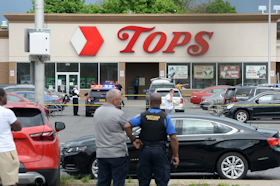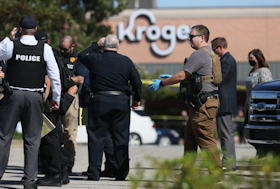|
More Than 1 in 6 Mass Shootings Since 1966
Happened in Retail Settings
'I
wake up hearing shots still.' Kroger, supermarkets ponder what to do about
shootings
More than 1 in 6 mass shootings since 1966 have
taken place in a retail setting with supermarkets becoming an increasingly
popular target.
More than 1 in 6 mass
shootings since 1966 have taken place in a retail setting
with supermarkets becoming an increasingly popular – and deadly – target,
according to the
Violence Project, a nonprofit research group in St. Paul, Minnesota.
 Three
of the most deadly supermarket attacks have occurred in the past three years:
the
mass shooting at a Tops Friendly Market in Buffalo that killed 10 early on May
14 this year, the 10 killed in Boulder in early 2021 and
the shooting that killed 23 in a Walmart in El Paso in 2019. Three
of the most deadly supermarket attacks have occurred in the past three years:
the
mass shooting at a Tops Friendly Market in Buffalo that killed 10 early on May
14 this year, the 10 killed in Boulder in early 2021 and
the shooting that killed 23 in a Walmart in El Paso in 2019.
Advocates hope
gun reform signed into law this summer slows the tide of violence.
Meanwhile,
Kroger and other retailers are
reluctant to make sweeping changes that could be costly, disruptive to the
shopping experience or
offend a significant number of the millions of customers it handles every day.
Cincinnati-based Kroger says it
last changed its gun policy to make customers feel safer in 2019 but won't
discuss how it enforces it or its security measures in general. Lopez said her
store in Boulder installed an exterior exit near her shop after the Boulder
shooting.
The company and other
retailers face a handful of
lawsuits in the wake of past shootings.
But lawsuits generally don't demand Kroger adopt specific safety measures. And
it's not clear what a supermarket could do. No one wants to go through a metal
detector in order to grab a gallon of milk. Some grocery stores are adding armed
security guards, which can make shoppers uncomfortable.
Eugene Volokh, a law professor at the University of California at Los Angeles,
said
it's hard to say what
reasonable precautions a supermarket should take against mass shooters.
While such gun violence has become all too common, it's not as common as say bar
fights that have made bouncers a fixture at drinking establishments nationwide.
"It's really hard to show what's reasonable," Volokh said. "You can certainly
argue gun violence is more frequent, but it's hard to argue (a mass shooting) is
predictable."
The Collierville, Tennessee
shooting lawsuit
 In
the wake of another shooting in suburban Memphis, a Kroger worker has filed a
lawsuit against the grocer. Mariko Jenkins
accuses the grocer of not
doing enough to prevent the shooting.
Jenkins was one of more than a dozen people shot during the attack that left one
dead besides the gunman. In
the wake of another shooting in suburban Memphis, a Kroger worker has filed a
lawsuit against the grocer. Mariko Jenkins
accuses the grocer of not
doing enough to prevent the shooting.
Jenkins was one of more than a dozen people shot during the attack that left one
dead besides the gunman.
The lawsuit says Kroger was warned by employees that Thang had “a history of
anti-social, antagonistic, volatile, unstable, threatening and predictably
dangerous behavior,” yet he wasn’t fired earlier and
security at the store wasn’t
adequate to prevent the attack.
The lawsuit is seeking unspecified monetary damages.
Snowfox, the sushi vendor, is also a defendant in the lawsuit. Kroger declined
to discuss the shooting or the lawsuit. Snowfox did not respond to a message
seeking comment.
One of Jenkins' coworkers, Alexus Turner, 21, remembers another moment before
her Kroger store in suburban Memphis was attacked Sept. 23, 2021.
It was just a glance before her shift started, but she saw her Kroger coworker
in the parking lot a few hours before his shooting rampage.
Turner was walking into the store for her 11 a.m. shift for Kroger Pickup
(previously called ClickList), when she saw the sushi guy, Uk Thang, 29. He was
talking to someone in the parking lot – or rather getting a talking to, by
someone she assumed was his supervisor at the store.
“He didn’t look happy, he glared,” Turner recalled, adding coworkers described
Thang, who worked for the vendor, as rude and childlike and avoided speaking
with others. Thang was fired, but came back to the store within hours and shot
15 people, killing a coworker then himself, police said.
Turner is not a party in the Jenkins lawsuit. But she is
part of a growing population
of grocery workers that live the aftermath of a mass shooting at a supermarket.
She's not sure what the answer to the problem is. She grew up in Alabama
surrounded by guns, but this didn't happen, she said. She wonders what would
have happened if Kroger had fired Thung earlier. Finally, she wonders if better
screening for people with mental illness in gun background checks might be a
good step.
Though she escaped physical injury, Turnersaid the experience has profoundly
affected her life, especially her ability to sleep.
“I wake up hearing shots still … I dream of this day over and over again. The
shooter is always trying to kill me,” Turner said.
Daniel Webster, a health professor with Johns Hopkins University and director of
its Center for Gun Violence Prevention and Policy, said
supermarkets may attract
assailants because they service hundreds of potential victims.
They also are important to the community a gunman seeks to terrorize.
“It’s a gathering place
and if you want to terrorize a community, that’s a place you can go do it,”
Webster said, adding the El Paso shooting that killed so many
may have spurred “copy-cat”
attacks.
&uuid=(email))
“Gun violence that took
place used to be robberies. Now, today, it's just random violence,”
Marc Perrone, president of the United Food and Commercial Workers International,
told The Enquirer. “It's associated with somebody trying to make some sort of
political statement.”
Supermarket shootings directed
at racial or ethnic minorities
Many of the attacks were acts
directed at racial or ethnic minorities.
The shooter in El Paso specifically targeted Mexicans, while the Buffalo shooter
was looking for Black victims.
Advocates praise the
gun control law signed into law this summer by President Joe Biden, but say they
won’t cure America’s ongoing wave of mass shootings. The new law helps curb gun
violence by funneling money to prevention programs, such as training for local
law enforcement of red flag laws that allow the temporary seizure of guns from
someone deemed a risk to themselves or others.
Such a measures might have helped. In many of the shootings at Kroger and other
retailers, relatives expressed concern for the attackers' mental health.
With no major gun safety legislation passed for 30 years until this summer,
Kroger and other private
businesses have faced pressure in recent years to make sure their stores are
safe.
In 2019
Kroger changed its gun policy
asking customers to leave their guns at home.
Their previous policy was to follow local open-carry rules. Company officials
said the request, similar to one by Walmart earlier that year, was effectively a
gun ban and the presence of fewer guns would make customers feel safer. But
Kroger officials never explained how the company would enforce the policy.
In 2018
Kroger discontinued the sale of firearms from its Fred Meyer subsidiary.
Kroger was prompted to take action following the El Paso shooting a string of
smaller attacks,
including a 2018 racially motivated double murder in a Louisville store.
Besides Kroger stores, the grocer operates several regional supermarket chains
in 35 states, including Fred Meyer, Harris Teeter, Ralphs, Mariano's, Fry's,
Smith's, King Soopers, QFC and others. The company has nearly 2,800 stores and
employs 420,000 workers. The retailer is vying to add more than 2,000 stores and
hundreds of thousands of workers after announcing earlier this month
it would acquire industry rival Albertsons in a $25 billion deal subject to
regulatory approval.
Cincinnati, Kroger's home,
hasn’t been spared from gun violence at supermarkets.
On March 25 at the Kroger in the Hyde Park neighborhood, an employee allegedly
fired several shots during an argument with a customer in the parking lot
following a scuffle inside the store.
Kevion Howze, 24, was indicted this spring on attempted murder and other
charges.
“It’s a miracle that no one was seriously injured,”
Hamilton County Prosecutor Joe
Deters said. “People should be outraged at what is currently going on. No
one should fear getting shot while they are simply trying to shop at their local
Kroger.”
cincinnati.com
|